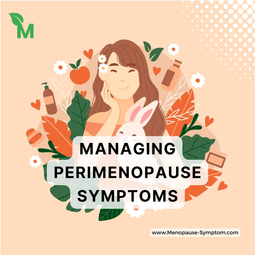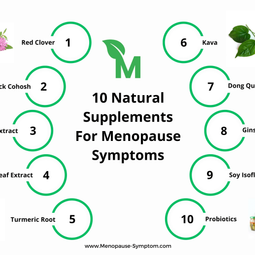Embracing Change: Natural Ways to Manage Perimenopause Symptoms
Understanding Perimenopause: A New Chapter in Women's Lives
Perimenopause is a natural transition that every woman experiences as she approaches menopause. This phase, often starting in the mid-40s, can bring about a range of physical and emotional changes. While it's a normal part of aging, the symptoms can be challenging to navigate. But fear not! There are numerous natural ways to manage perimenopause symptoms effectively, allowing you to embrace this new chapter with confidence and grace.
Common Perimenopause Symptoms: What to Expect
Before we delve into management strategies, let's briefly explore some common perimenopause symptoms:
Irregular periods
Hot flashes and night sweats
Mood swings and irritability
Sleep disturbances
Weight gain and slowed metabolism
Vaginal dryness and decreased libido
Changes in skin and hair texture
Understanding these symptoms is the first step in learning how to manage them effectively. Remember, every woman's experience is unique, and you may not encounter all of these symptoms.
Nutrition: Your Ally in Managing Perimenopause Symptoms
Embrace a Balanced Diet
One of the most powerful tools in managing perimenopause symptoms is your diet. A balanced, nutrient-rich eating plan can help alleviate many of the discomforts associated with this transition.
Increase your intake of fruits and vegetables
Choose whole grains over refined carbohydrates
Include lean proteins in your meals
Incorporate healthy fats like those found in avocados, nuts, and olive oil
Phytoestrogen-Rich Foods: Nature's Hormone Balancers
Phytoestrogens are plant-based compounds that mimic estrogen in the body. Including these foods in your diet may help balance hormone levels and reduce symptoms like hot flashes:
Soy products (tofu, tempeh, edamame)
Flaxseeds and chia seeds
Legumes (lentils, chickpeas, beans)
Fruits (apples, pears, grapes)
Stay Hydrated
Proper hydration is crucial during perimenopause. Drinking plenty of water can help:
Reduce bloating
Alleviate hot flashes
Improve skin elasticity
Support overall well-being
Exercise: A Powerful Tool for Symptom Management
Regular physical activity is a game-changer when it comes to managing perimenopause symptoms. Not only does it help maintain a healthy weight, but it also:
Improves mood and reduces stress
Enhances sleep quality
Strengthens bones and muscles
Boosts energy levels
Finding the Right Exercise Routine
The key is to find activities you enjoy and can sustain long-term. Consider incorporating a mix of:
Cardiovascular exercises (walking, swimming, cycling)
Strength training (weight lifting, resistance bands)
Flexibility exercises (yoga, stretching)
Balance exercises (tai chi, pilates)
Remember: Listen to your body and start slowly if you're new to exercise. Gradually increase intensity and duration as you build stamina.
Stress Management: Cultivating Inner Peace
Stress can exacerbate perimenopause symptoms, making it crucial to develop effective stress management techniques. Here are some strategies to consider:
Mindfulness and Meditation
Practicing mindfulness and meditation can help reduce anxiety, improve sleep, and promote overall well-being. Even just a few minutes of daily meditation can make a significant difference.
Deep Breathing Exercises
Simple breathing exercises can help calm your mind and body, especially during moments of stress or when experiencing hot flashes.
Prioritize Self-Care
Make time for activities that bring you joy and relaxation. This could be reading a book, taking a warm bath, or pursuing a hobby you love.
Natural Supplements: Supporting Your Body's Balance
While a healthy diet should be your primary source of nutrients, certain supplements may help manage perimenopause symptoms:
Black Cohosh: May help reduce hot flashes and night sweats
Evening Primrose Oil: Can alleviate breast tenderness and mood swings
Magnesium: Supports bone health and may improve sleep quality
Vitamin D: Essential for bone health and mood regulation
Always consult with your healthcare provider before starting any new supplement regimen, as some may interact with medications or have contraindications.
Sleep Hygiene: The Importance of Quality Rest
Quality sleep is crucial for managing perimenopause symptoms and overall health. Establish a consistent sleep routine by:
Going to bed and waking up at the same time each day
Creating a cool, dark, and quiet sleep environment
Avoiding screens for at least an hour before bedtime
Limiting caffeine and alcohol consumption, especially in the evening
Herbal Remedies: Nature's Soothing Touch
Many women find relief from perimenopause symptoms through herbal remedies. Some popular options include:
Red Clover: May help reduce hot flashes and improve bone density
Dong Quai: Traditional Chinese herb used to balance hormones
Ginseng: Can help with fatigue and mood swings
Chasteberry: May help regulate menstrual cycles
As with supplements, always consult a healthcare professional before using herbal remedies, especially if you're taking other medications.
The Power of Community: Connecting with Others
Remember, you're not alone in this journey. Connecting with other women experiencing perimenopause can provide valuable support, insights, and a sense of community. Consider:
Joining a support group (online or in-person)
Talking openly with friends and family about your experiences
Seeking guidance from a healthcare provider specializing in women's health
Embracing the Journey: A Positive Mindset
While managing perimenopause symptoms can be challenging, it's important to maintain a positive outlook. This transition is a natural part of life and can be an opportunity for growth and self-discovery.
Focus on the aspects of your life you can control
Practice gratitude for your body and its resilience
Celebrate the wisdom and experience you've gained over the years
By adopting these natural strategies to manage perimenopause symptoms, you can navigate this transition with greater ease and confidence. Remember, every woman's experience is unique, so be patient with yourself and don't hesitate to seek professional advice if needed. Embrace this new chapter of your life with open arms, knowing that you have the power to thrive during perimenopause and beyond.
Source: Team MPS compiled, analyzed and wrote. Please dont reup without source of us. Many thanks.

Managing Perimenopause Symptoms
Invalid Date

Managing Menopause Symptoms
Invalid Date

10 Natural Supplements For Menopause Symptoms
Invalid Date

